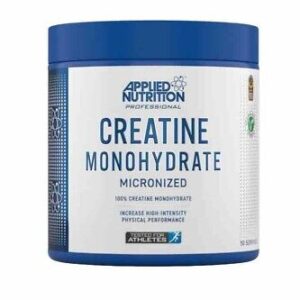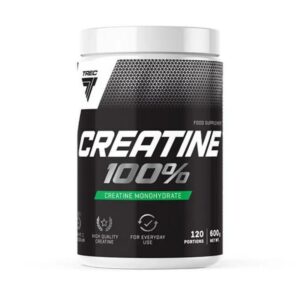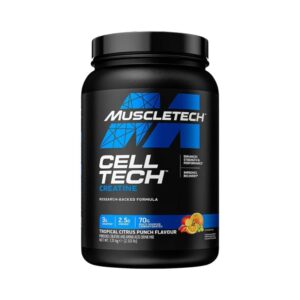Power of Creatine Monohydrate: Benefits, Dosage, and Myth

Creatine monohydrate is one of the most popular supplements in the field of fitness and athletic performance. Creatine, known for its exceptional ability to increase strength, endurance, and recovery, has become a must-have for athletes and fitness enthusiasts alike. Despite its popularity, misconceptions about this powerful supplement persist, leaving many people unclear of its true potential. In this post, we’ll reveal the mysteries of creatine monohydrate, including its benefits and recommended dosage, as well as dispelling popular fallacies about the supplement. Understanding creatine can help you power through strenuous workouts or enhance your overall health.
Creatine: How It Works
Creatine is a naturally occurring substance found largely in muscle cells that aids in the synthesis of energy during high-intensity exercise. Creatine can be synthesised by the body from amino acids in the liver, kidneys, and pancreas, as well as received through dietary sources such as red meat and fish. Creatine, once ingested or synthesised, is transported to muscle cells and transformed into phosphocreatine. This stored form of creatine serves as a rapidly available source of high-energy phosphates, which can be used to replenish adenosine triphosphate (ATP), our cells’ basic energy currency.
Furthermore, it has been demonstrated that creatine raises the water content of muscle cells, facilitating cellular development and hydration. In addition to increasing muscle size, this volumising impact promotes an anabolic environment that is favourable for muscle growth and repair. For athletes seeking to optimise their performance and recuperation, creatine is a vital tool due to its dual benefits of increased muscle cell volume and improved ATP regeneration.
Creatine has also been demonstrated to raise the water content of muscle cells, which supports cellular development and hydration. In addition to increasing muscle size, this volumising impact promotes an anabolic environment that is favourable for muscle growth and repair. For athletes seeking to optimise their performance and recuperation, creatine is a vital tool due to its dual benefits of increased muscle cell volume and improved ATP regeneration.
Advantages of Creatine Monohydrate
-
Applied Nutrition
Applied Nutrition Creatine Monohydrate Micronized Powder – 250g
£19.99 Select options This product has multiple variants. The options may be chosen on the product page -
Monohydrate
Optimum Nutrition 100% Pure Micronised Creatine Powder Unflavoured
£19.99 – £34.99 Select options This product has multiple variants. The options may be chosen on the product page -
Creatine
Trec Nutrition 100% Creatine Monohydrate
£14.99 – £29.99 Select options This product has multiple variants. The options may be chosen on the product page -
Creatine
MuscleTech CellTech Creatine – 1130g
£29.99 Select options This product has multiple variants. The options may be chosen on the product page -
Creatine
Refined Nutrition Ultra Creatine Monohydrate Unflavoured
£19.99 – £24.99 Select options This product has multiple variants. The options may be chosen on the product page
It is well known that creatine monohydrate can improve physical performance, especially in tasks requiring strength and power. Increasing muscle strength and power output is one of its most alluring advantages. Research has repeatedly demonstrated that taking creatine supplements significantly enhances a person’s capacity to engage in short-duration, high-intensity workouts.
This can result in increased weightlifting, more repetitions, or faster sprinting—all of which enhance overall athletic performance.In addition to enhancing strength and power, creatine is essential for muscular hypertrophy, or the expansion of muscle mass. Muscle protein synthesis benefits from the volumising effect of creatine, which raises the water content of muscle cells. This promotes muscle fibre growth and repair after vigorous exercise, which eventually results in larger increases in muscle mass. This translates into bigger, fuller muscles and a better physique for bodybuilders and strong athletes.
It has also been demonstrated that creatine improves recovery by lowering inflammation and muscle damage. Muscles frequently sustain microtrauma following strenuous exercise, which causes pain and takes longer to recover from. By stabilising cellular membranes and lowering the synthesis of inflammatory indicators, creatine helps lessen these effects. Athletes can train more frequently and at higher intensities when they recover more quickly, which improves their performance and outcomes.
Check for Applied Nutrition Creatine monohydrate…
Advantages of Creatine Monohydrate
For creatine monohydrate to have the greatest possible advantages, the ideal dosage must be established. A loading phase is followed by a maintenance phase in the most widely advised regimen. For five to seven days during the loading phase, people usually take 20 grams of creatine a day, split into two 10-gram portions. This method rapidly saturates muscle creatine reserves, resulting in performance gains that happen sooner.
It’s crucial to remember that every person reacts differently to creatine supplements. The ideal dosage can vary depending on a number of factors, including body weight, muscle mass, and training intensity. A sports nutritionist or medical expert can help customise the dosage to meet specific requirements, guaranteeing the safe and efficient usage of creatine monohydrate.
Advantages of Creatine Monohydrate

Many creatine monohydrate myths exist despite its widespread use and significant research. Creatine damaging kidneys is a widespread belief. Numerous studies have shown that creatine supplementation in approved doses does not harm renal function in healthy people. Early myths and anecdotes fuel kidney health concerns, not science
Creatine myths include dehydration and muscle spasms. Despite popular assumption, creatine draws water into muscle cells to hydrate them. The volumising effect helps prevent dehydration during exercise. Creatine supplementation has not been linked to muscle cramping.
Some worry creatine may make them fat or bloated. Creatine can temporarily raise body weight due to muscle cell water retention, however this does not cause fat accumulation. Minimal weight changes are outweighed by increased muscle volume and performance.
Creatine with Other Supplements
Creatine monohydrate can be taken with other substances to boost performance and recovery. Creatine with whey protein, which offers critical amino acids for muscle repair and growth, is a popular combo. Together, especially post-workout, these substances boost muscle protein synthesis and repair.
Creatine plus beta-alanine, an amino acid that buffers lactic acid in muscles, reduces tiredness during high-intensity exercise. Creatine and beta-alanine boost anaerobic and aerobic performance, making them a potent pair for strength and endurance athletes.
BCAAs or EAAs can boost muscle recovery and minimize exercise-induced soreness when added to creatine. These amino acids rebuild muscle and maintain energy after long workouts. By strategically combining creatine with complimentary nutrients, athletes can maximize training results.
Are you sure that creatine is right for you?
One of the best and most researched supplements for improving athletic ability and helping muscles grow and recover is creatine monohydrate. It’s useful for athletes of all kinds and types because it can help them get stronger, faster, and more durable. Although there are some possible side effects to think about, they are usually not too bad as long as you take the right amount of medicine and stay hydrated.
Because creatine can be used in many different ways, it can help a lot of different people, from competitive players to people who just like to work out for fun. Adding creatine to your supplement routine can help you reach your goals of building muscle, getting better at your workouts, or just staying healthy in general. Anytime you take a supplement, you should talk to a doctor or nurse to find out the best way to meet your specific wants and goals.
You can get the most out of creatine and reach new fitness goals if you understand how it works, what its benefits are, and how to use it correctly. Take advantage of creatine monohydrate’s power and see how it can improve your training and ability in general.






